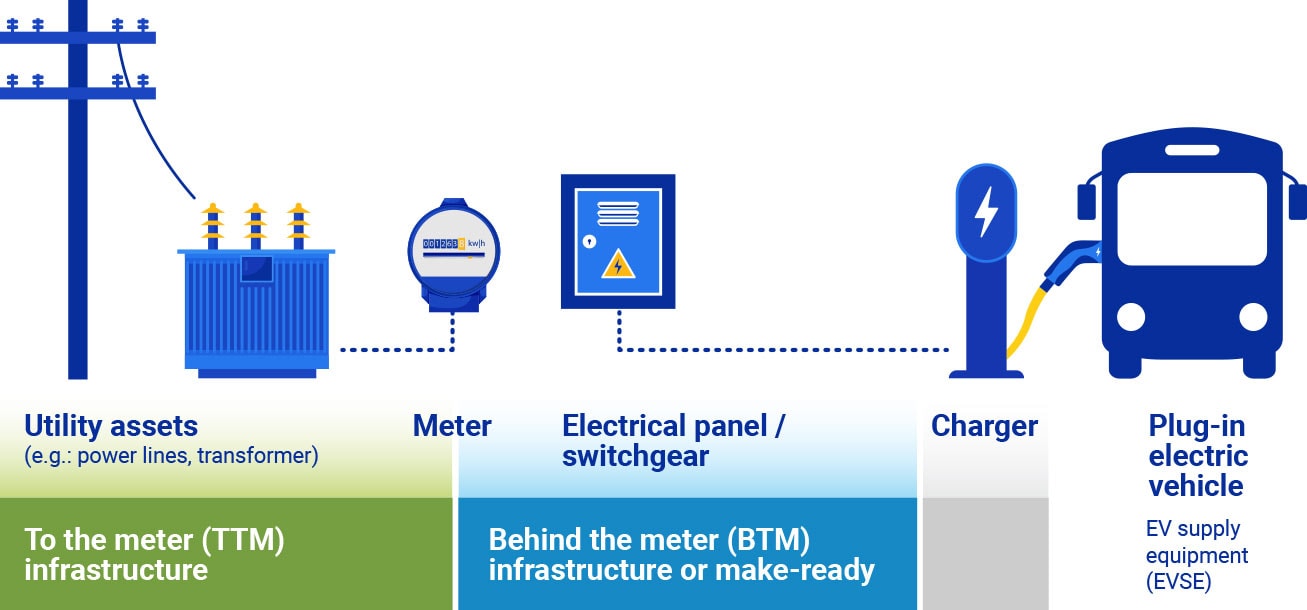EV Fleet Charging
Simplify Electrification of Your Fleet
Electric vehicle fleets have increased due to falling costs and widening availability. Due to support from policymakers, US sales of commercial EVs have continued to grow. Looking ahead, the operators of vehicle fleets may be especially enthusiastic buyers of EVs. EVs do cost more than comparable vehicles with internal combustion engines (ICEs). However, their superior efficiency, the moderate price of electricity, and the high utilization of fleet vehicles allow fleet operators to quickly recoup the extra up-front cost of an EV and achieve a lower total cost of ownership. Expert studies suggested that fleet EVs can have a total cost of ownership that is 15 to 25 percent less than that of equivalent ICE vehicles.
Core Development Group understands the unique charging requirements of electric light-, medium-, and heavy-duty fleets. We work with you to customize solutions that maximize operational performance and future-proof your electrification plans as you scale.
Benefits of fleet charging infrastructure
Save Money
Eliminate Tailpipe Emissions
Simplify Maintenance
Plan for Future
Incentives
Sustainability Initiatives
An EV fleet is a group of electric vehicles owned or leased under the same ownership. Fleet vehicles can be operated by a business,
government agency, or non-profit organization, among other entities. Often fleets are comprised of larger vehicles for commercial and industrial purposes or transport.
Types of EV Fleets Include:
- Distribution & Delivery Fleets
- Shuttle Bus Fleets
- School Transport Fleets
- Transit Fleets
- Commercial or Utility Fleets
- Last Mile Delivery Fleets
Road map to fleet electrification
Engineering
Utility Coordination
Permitting
Construction
EV Charging
Engineering
Utility Coordination
Permitting
Construction
EV Charging

EV Fleet Charging Solutions
EV fleet charging stations can be installed where businesses or organizations need the EV charging, which is often a facility headquarters, key distribution hub, or a strategic location on the fleet EV route. A key variable is the utility electricity service and the EV charging infrastructure. EV charging stations need to be able to adequately connect into the utility and electricity grid to electrify a fleet. Charging infrastructure can be designed and constructed with or without existing electrical infrastructure.
Electric vehicles present a whole new set of challenges when compared to diesel or gas-powered cars. Fleet customers looking for an affordable, sustainable way to electrify their vehicles need to be aware of these challenges. Fleet owners need to be aware of high demand charges and the energy cost associated with EV infrastructure. Incorporating things such as energy storage and smart charging will help keep electricity costs down.
Fleet Electrification Makes Sound Business Sense
Electrification represents an appealing opportunity for fleet owners and managers, especially when factoring in the enormous, anticipated investments by the federal government over the next decade that will help drive down costs. Businesses need to invest now in smart grid technology that helps them better manage energy demand and consumption, enabling them to charge their fleets sustainably without overwhelming the grid. Working together with local utilities, regulators, and suppliers, fleet operators can make important strides in meeting the nation’s climate goals through the electrification of fleets, a strategy that can also yield considerable economic benefits. Leverage Core Development Group’s expertise in fleet electrification to help reduce risk and make the transition to EVs less complicated.








